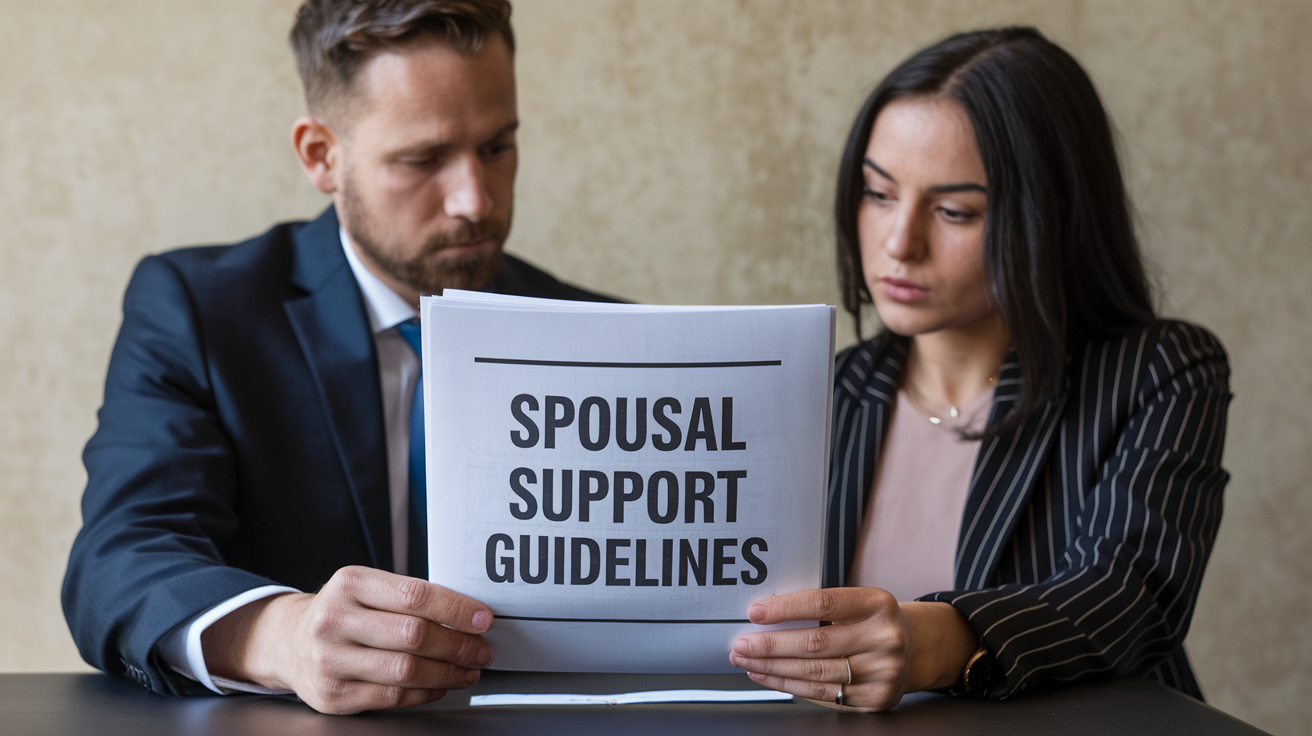Ever wondered if discussing a prenuptial agreement means you don’t trust your partner?
The reality is that a prenup can actually help both of you understand your financial rights and responsibilities from the start.
A well-crafted prenup makes divorce less stressful and clearer if things don’t work out.
This article explores into how prenups impact divorce settlements, exploring their benefits and limitations.
Discover what these agreements can and can’t protect, how courts view them, and why having one might save you time and money.
What is a Prenuptial Agreement?

A prenuptial agreement is a legal contract signed by two people before they get married.
This document describes how the parties will manage their money, property, and debts if they divorce. It is a financial plan that both partners agree to ahead of time.
The agreement can include details about who owns what before marriage, how to split assets gained during marriage, and whether one person will pay support to the other after divorce.
It helps couples talk openly about money matters before saying “I do” and can prevent conflicts later.
How Do Prenups Affect Divorce Settlements?
Here are some ways prenuptial agreements can shape divorce settlements, ensuring clarity and minimizing conflicts.
1. Property Division Clarity

The prenuptial agreement sets clear rules about dividing property during divorce.
Instead of following standard state laws, the couple can specify how to split their assets. This includes homes, cars, investments, and personal items.
The agreement might state that property owned before marriage stays with its original owner, or it could outline a specific way to divide things gained during marriage.
A clear prenup reduces arguments about who gets what, making the divorce process faster and less costly.
2. Financial Protection Measures

Prenups protect specific assets from being split in divorce.
This includes family businesses, inheritances, or personal savings. The agreement can shield these assets, ensuring they remain with their intended owner.
For business owners, this protection helps maintain control over their companies during divorce.
The agreement might also protect future income, retirement accounts, or expected inheritances. Such measures prevent lengthy court battles over valuable assets.
3. Debt Allocation Rules

Prenuptial agreements establish how debts will be handled in divorce. This covers both existing debts and those acquired during marriage.
The agreement might specify that each person keeps their own debt, or it could outline a plan for sharing joint debts.
Clear debt rules prevent one person from being stuck with the other’s financial obligations.
The prenup can also protect against future debts, like student loans or business loans taken by one spouse.
4. Spousal Support Guidelines

A prenup can set terms for spousal support payments after divorce.
It might specify a fixed amount, a calculation method, or state that no support will be paid.
These terms help both people plan their financial futures with certainty.
The agreement could include conditions for support, like payment duration or circumstances that might change the amount. Having these terms preset reduces disputes during divorce.
5. Business Interest Protection

For business owners, prenups offer specific protections during divorce. The agreement can keep business assets separate from marital property.
It might prevent a spouse from claiming part ownership or profits. This protection helps maintain business operations during divorce.
The prenup can also address how business value increases will be handled. These measures protect both the business owner and their business partners.
6. Retirement Account Division

The agreement can establish how retirement accounts will be split. This includes 401(k)s, IRAs, and pension plans.
Prenups might keep these accounts separate or set specific division rules. Clear terms prevent complications with retirement planning.
The agreement can also address future retirement contributions. These provisions help both people maintain financial security after divorce.
7. Post-Divorce Financial Planning

Prenups help both people plan their financial futures after divorce. The agreement provides certainty about available resources.
It lets each person make informed decisions about careers and lifestyles. Clear financial terms help in planning for housing, education, or retirement.
The prenup can include provisions for changing financial circumstances. This forward-thinking approach makes post-divorce transitions smoother.
How Prenups Work in Divorce
Here are some essential steps to understand how prenups influence the process and ensure clarity during the division of assets.
Step 1- Filing for Divorce
The divorce process begins when one spouse files legal papers. This activates the prenuptial agreement’s terms.
Both lawyers get copies of the prenup and start reviewing its contents. The filing spouse must follow proper court procedures, even with a prenup in place.
At this stage, both parties need to gather all financial documents to show their current situation.
Step 2- Reviewing the Agreement
Lawyers examine the prenup carefully to make sure it’s still valid. They check if all requirements were met when it was signed, such as full financial disclosure and proper legal representation.
They also look for any terms that might not be legal or enforceable now.
Both parties must share current financial records to compare with what was disclosed when signing the prenup. This review ensures the agreement still serves its intended purpose.
Step 3- Following Division Rules
The couple starts dividing their property based on the prenup’s terms.
This means separating individual property listed in the agreement and identifying shared property for division.
The process includes handling joint accounts, investments, and other assets as specified in the agreement.
Each item gets sorted according to the prenup’s instructions, making the division process more straightforward than in divorces without such agreements.
Step 4 – Court Approval
A judge reviews the prenup to confirm several key points. The court checks that both people signed willingly and that nobody hid assets.
The terms must not be extremely unfair, and all basic legal requirements need to be met. The judge looks for signs of fraud or pressure during the original signing.
If problems appear, the court can reject unfair or invalid parts while keeping the rest of the agreement intact.
Step 5 – Property Division
This step involves the actual transfer of assets according to the approved plan.
It includes changing property titles, moving money between accounts, and transferring investment ownership.
The couple must also handle retirement account splits and deal with shared debts. Each transfer gets documented with proper legal papers to ensure clear ownership records.
Step 6 – Support Payments
When the prenup includes support terms, the couple sets up payment schedules and creates bank transfers as needed.
The agreement guides how much support will be paid and for how long. Any conditions that might change these payments get clearly documented.
This step creates a solid framework for future financial obligations between the former spouses.
Step 7- Final Settlement
The divorce settlement pulls together all decisions about property divisions and support arrangements.
It addresses tax considerations and insurance changes that need to happen. Any name changes also get handled at this point.
Both people review and sign the final papers, making the agreement official and binding.
Step 8 – Moving Forward
After completing the settlement, practical changes begin. New property deeds get recorded, and account names get updated.
Support payments start flowing according to the agreement. Insurance policies change to reflect the new situation.
Each person receives copies of all documents for their records. This final step sets both parties on their separate paths with clear financial boundaries.
Valid Prenup Agreements

Understanding the key legal requirements is crucial for creating a valid and enforceable prenuptial agreement. Here’s a overview of what you need to consider.
Legal Requirements
- Both partners must share complete financial information
- Each person needs their own lawyer for independent advice
- The agreement must be signed well before the wedding date
- Proper notarization and witness signatures are essential
Fair and Clear Terms
- All property division rules must be clearly written
- Support payment terms need specific amounts or formulas
- Asset protection plans should be reasonable for both sides
- Financial responsibilities during marriage must be stated
Complete Documentation
- Full list of each person’s assets and debts
- Details of any business ownership interests
- Expected inheritances or family gifts
- Income sources and financial obligations
- Future property plans and division methods
State Law Compliance
- Different states have different rules for prenups
- Some states require specific formats or language
- Certain terms might not work in all states
- Moving to a new state might affect the agreement
- Provisions must match local marriage laws
When Can a Prenup Be Challenged?
- Lack of Honesty in Financial Disclosure: If one person didn’t reveal the full truth about their money or property, the prenup can be challenged. This also applies if someone felt forced to sign or didn’t have enough time to review the agreement.
- Unfair Terms: Courts closely examine prenups that seem extremely unfair to one party. If the terms heavily favor one person, the agreement may not be upheld.
- Technical Mistakes in Execution: Errors in how the prenup is written or executed can invalidate it. This includes missing signatures, lack of notarization, or failure to follow legal procedures.
- Lack of Legal Representation: If one or both parties didn’t have lawyers to explain the prenup, that could be grounds for challenging the agreement in court.
- Changed Circumstances: Courts will consider if major life changes have occurred, such as disability or having children, which could warrant revisiting the terms. Time passed since signing also matters and may influence the enforceability of certain provisions.
- Fraud or Incomplete Disclosure: Prenups can be challenged if fraud is involved, there was incomplete financial disclosure, or the terms go against public policy. These issues can lead to the agreement being deemed invalid.
- Unenforceable Child Custody or Support Provisions: Prenups that include terms about child custody or support that go against legal standards or public policy can fail in court.
The Role of Courts and Legal Advice in Prenups

Courts ensure prenups are valid and fair during divorces. They check for voluntary agreement, compliance with state laws, and consider changes in circumstances.
Judges uphold prenups made properly, but won’t enforce those violating laws or public policy.
Legal advice is crucial in creating a valid prenup. Each person should have their own attorney for protection.
Lawyers explain the agreement, identify issues, and ensure all necessary information is included.
They help prevent invalidation in court and suggest changes to make the prenup fairer and more enforceable.
Lawyers track changing laws, explain state differences, and ensure the agreement covers all important issues.
They can also help modify the prenup if circumstances change and both partners agree. Having separate lawyers shows both parties received independent advice before signing.
Conclusion
A prenuptial agreement serves as a valuable tool for couples planning their financial future together.
When written properly, it protects both partners’ interests and makes the divorce process simpler if the marriage ends.
The key to a strong prenup lies in open communication, complete honesty about finances, and getting proper legal guidance.
These agreements work best when both partners have time to review them, understand the terms fully, and sign without pressure.
While no one plans for divorce, a prenup offers peace of mind by setting clear rules about property, debts, and support.
For couples considering marriage, talking about a prenup early can lead to better financial understanding and fewer conflicts down the road.
Frequently Asked Questions
Will a Prenup Protect You in Divorce?
Yes, a prenup protects assets and speeds up divorce settlements when written correctly and signed properly with legal guidance.
Who Benefits More from a Prenup?
Both partners benefit from a prenup. It gives clear financial rules and protects each person’s assets brought into marriage.
Do marriages with Prenups last longer?
No clear evidence shows prenups affect marriage length. The agreement’s main purpose is financial protection, not marriage success.








